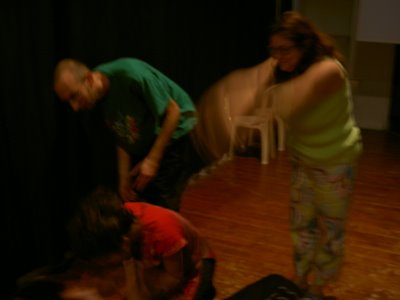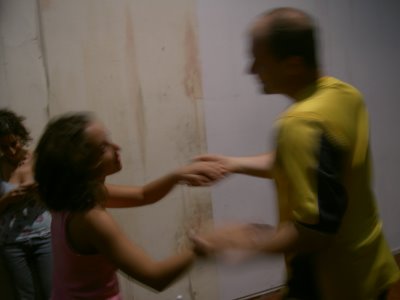Volunteers Workshop
The workshop is in the Theatre Monnot in a leafy part of Beirut that could be a posh suburb of Paris; a mixture of greenery, pleasing modern buildings and beautiful old ones with ornate balconies, shutters and little ladies watering their plants above our heads.
We park and walk towards a church set back from the road - part of the St Joseph's University campus. The theatre is in the basement of the next building along on the same campus. It was once a car-park I learn later.
We go to the office. We're early and want to acclimatise ourselves to the space. We tap on the office door and go it. Suddenly, surprise! Samar jumps up and down. Ziad! Fantastic! Big smiles. They know each other from way back and, it later turns out, used to organise parties around Beirut, less for the money than for the fun of transforming people's flats, changing the lighting, arranging a bar and the guests they could invite. They talk about doing the same for the trainers before we leave...
We meet Nabil, the Administrator of the Theatre. He bears an uncanny ressemblence to Dr David Kelly, the govenment scientist who killed himself after the invasion of Iraq. He also speaks excellent English.
We have a look at the room we'll be working in. It's small but ok. We talk about the war. About how it's wiped out Monnot's programme for a month or two - this is basically a 'touring house' and obviously companies have obviously cancelled. Next year, though, there's a big storytelling festival. Before the war Chekhov.
I re-arrange the space a little. I sweep the floor. It's my normal nesting proceedure. I try and make everything a clean as possible, visually and floor-wise.
Samar and I go outside to have a look at the Church. It's closed so we decide to find somewhere to have a coffe before the workshop starts but The Volunteers arrive early as we're passing a car-park and taking picture of Absolut Vodka posters that are piggybacking on the war. And image of a typical Lebanese building brick with the slogan Absolut Determination. There's another one with an aeroplane gangway packed with people seen from above and the slogan Absolut Return.
I wonder what the Absolut poster campaign is in Israel... Absolut Misery? Absolut PR Disaster? Absolut-ely Nowhere?
We sit with the early arrivals in the church gardens. At six we go into the room to begin the workshop.

We start with the Topology game. I decribe a big map of Beirut on the floor of the rehearsal room. Everybody has to stand where they were sleeping last night. This involves negotiation, obviously. ('Where are you then?' 'I'm on the Corniche' 'Ok, well I'm in Hamra''No this isn't Hamra. This is Ashrafieh' etc...
We do the same for 23.59 December 31st 1999. We do the same for September 19th 1996 - ten years ago. Everybody remembers something and apart from Andrea and Jed who are back in London and Italy our Beirutis aren't anywhere too exotic. Hanifa is in Kuwait at one point, I remember. Heba is flying over Beirut (zigzagging more like) and someone else (Hanane?) is in Paris.
We do the 'Who's the tallest exercise'. One line. Tallest to the left. Shortest to the right. Once again negotiation. Negotiation and self organisation. This then becomes the 'Who's the oldest?' exercise. One line. Oldest at one end. Youngest at the other. This then becomes the who's got the lightest eyes? Who's got the darkest?' One line. Bit by bit the group is getting more comfortable with one another.
We play Grandmother's footsteps. Everybody enjoys this. Afterwards I talk about Focus. Precision. About how the players can go in a second from great energy to absolute stillness. And then back to great energy again.

We do Clapping Round the Circle. There are too many of us to do this in one circle so we make two. Each takes it in turn to watch the other. To learn from the other. This goes pretty well considering it's their first time with this kind of work. But the energy levels are quite different. The 'impulse' of the clap going round the circle seldom runs smoothly. Either it flags. Or it gets stuck somewhere where two players decide to have a little personal battle to the exclusion of the rest of the circle. Definitely one to continue and get better at...
We do Hide and Protect. This they love. All running round like lunatics chasing our tails until we're absolutely exhausted. I collapse on the parquet.
We now sit. I ask them to make pairs and talk to each other about their first day in school. Some claim that they can remember nothing about it. I tell them I'm the oldest person in the room and can remember SOMETHING. They begin. Soon they're talking away merrily. As they seem to be coming to the end of their natural span on this, I place a chair against the wall in the brightest part of the room.
The hot-seat.
I invite someone to come up and say what they've just said to their friends. At first people are reluctant. But one of the boys volunteers - I will find out his name today when we play name games - and he tells his story, in Arabic, with much confidence and good humour and everyone relaxes. We clap him at the end. Brother Courage. This breaks the ice and soon both our boys and our girls are coming up to the seat to tell their storie. After about six or seven we stop. Time presses.
I sit in the seat. I say that I've learned one Arabic word today: Lunchboxes. That thought I couldn't understand the stories, I could understand the enjoyment the audience were getting from the stories by the looks on their faces. That we all like stories. That that is what, if I had more time in Beirut, in Dahieh, I would do. I would get the stories of the mothers and fathers and grandmother's and grandfathers - and the children - who live round The Football Field.
That that would be a fascinating thing to put onto a 'stage'. Or onto celluloid. Or videotape.
We will return to this.
I then read them the Dumb-Show from Hamlet. As usual, I break it down into all the actions and ask the participants to mime each action: Enter a King... But I also ask them to enter as another king, and another and another, just so they don't always just go with their first idea, that there's not just one way of doing things. That there's not just one king. But hundreds. Hundreds of stories too.
 They then split into three groups of five or so and have five minutes to rehearse a dumb-show themselves = and they must perform the whole thing in 90 seconds. This rehearsal they do some using something, a watch, or their mobile phones to get the timing right.
They then split into three groups of five or so and have five minutes to rehearse a dumb-show themselves = and they must perform the whole thing in 90 seconds. This rehearsal they do some using something, a watch, or their mobile phones to get the timing right. And this we then see, each group in turn. And the work is really good. No one exceeds the time limit. But what is more important they really throw themselves into the physicality of it. They already know the physical language. Say to them: 'The Queen seems loate awhile but finally accepts his gifts': and they are all doing it with a vengeance. Like 'proper' actors.
I then ask them to do the same dumb show in 30 seconds - with a bit more rehearsal, cutting and tightening. Which they show. And then in 15 seconds. The same story!
Which they do. And we finish at 8.30 on the dot.
It's been a good first session. I'm really pleased. Everybody seems up for it and I can already see people who you'd love to make a film of. I think of some of those faces in The Battle of Algiers....
Later. In the the bar Barometer I talk with Ola about this. A project for the future, maybe?

0 Comments:
Post a Comment
<< Home